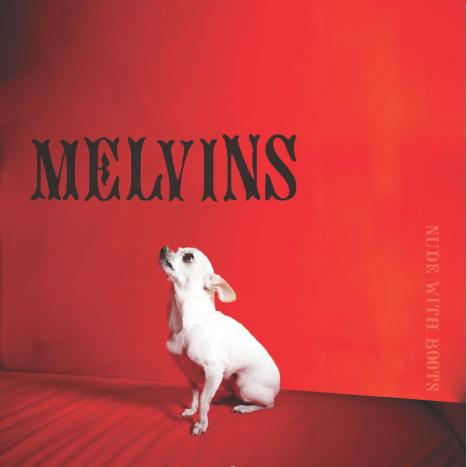The band that Melvins most resemble is, of course, Sparks. Admittedly Buzz Osbourne and Dale Crover aren’t brothers and haven’t scored a clutch of epochally strange top 40 hits here and there over the past three decades, but consider this: Like Sparks, Melvins are a duo with a shifting crew of additional bandmates and a boatload of famous fans who both worshipped at their feet and saw them as a source of inspiration. But above all else is the shared bloody-minded persistence in pursuing their own muse wherever it led, and the belief in being where and want to be right now instead of staying comfortable in the past. Like Ron and Russell Mael, Osbourne and Crover have created a series of albums that are immediately recognizable and still different from each other each time.
Thus Nude With Boots, the second full album that the quartet incarnation (Big Business’ Coady Willis and Jared Warren now fully integrated after the recording and tour for (A) Senile Animal) has released. It is a Melvins album straight through, from the cover art to the brilliantly contemptuous song titles (’Suicide In Progress’, ’The Savage Hippy’) to that core sound, an alternately sprawling and concise blast.
Yet there are always twists and variations. It’s not just the harmonizing that Osbourne and Willis continue to show, the one ghosting the other like an even more aggrieved wail, or Warren and Crover’s in-the-zone drumwork. For a start there are the anthems of the title track and ’The Kicking Machine’, classic rock if it actually lived and breathed. Then there’s the dank instrumental grind and theatricality of ’Dies Iraea’, an overt Morricone tribute that concludes with a rising feedback screech that rivals fingernails on glass; or the way that where a lot of bands would record a bunch of identikit tracks, on Nude With Boots the levels change song by song, different instruments taking the lead, vocals turning into surreal growls, drums becoming a lumbering powerhouse of industrial concussions.
That the final song is called ’It Tastes Better Than the Truth’ is apt. Black humour, contempt, glee in the observation, all set to a queasy bottom-end from Willis, a locked loop against wails and distorted words. Why end on a happy note, or without a smile that drips acid?


